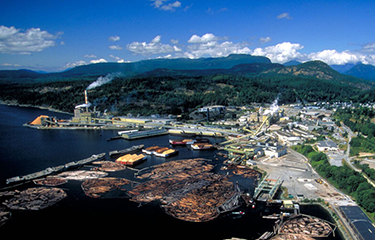The Tla’amin Nation in British Columbia, Canada, along with the qathet Regional District, are pushing for a defunct paper mill to potentially be used for land-based aquaculture.
The Catalyst Paper Tiskwat paper mill, owned by Paper Excellence, is located in B.C. and was shut down in November 2021. The mill sat unused until Paper Excellence decided in August 2023 to sell the property.
In response to Paper Excellence putting the mill up for sale, The Tla’amin Nation released a joint statement with the qathet Regional District – the local government authority overseeing the region in which the mill is located – calling for the tribe’s historic rights to the land be recognized, and for future uses of the site to be in line with the governments' vision for the region.
“The two governments are unified in their opposition to the sale of the property to any party that does not have the support of the Tla’amin Nation and the qathet Regional District,” the statement said.
The governments said any future operation at the site must be sustainable and match local values and aspirations.
“We are planning for a dynamic set of economic activities at Tiskwat, including low-carbon fuel production, value-added forest products, and land-based aquaculture – sustainable businesses that can benefit from the site’s unique attributes, such as existing infrastructure, availability of local hydro power, open water access, and proximity to population centers,” Tla’amin Nation Chief Hegus John Hackett said in a release.
The Tla’amin Nation has a 10,000-year history at the site, which was once the location of a village that was historically a productive salmon fishery and source of food for the Tla’amin people.
“The Tla’amin were forcibly removed ... in the late 1800s,” the joint statement said.
A treaty between the Tla’amin Nation and federal and provincial governments, which came into effect in 2016, recognizes the Tla’amin people’s claim and specifically “protects the Nation’s right to a specific claim to the Tiskwat site, which is now formally underway with the government of Canada,” the statement said.
“The Tla’amin Nation is currently conducting a detailed preliminary assessment of the state of infrastructure and environmental liabilities at Tiskwat, as well as an in-depth review of legal agreements between the present site owner and third parties, including Evolugen/Powell River Energy Incorporated and BC Hydro,” the joint statement said.
A land-based aquaculture facility could replace some of the salmon farms that were recently closed in the nearby Discovery Islands. In late 2020, the Canadian government announced it a phase-out of all existing salmon farms in the Discovery Islands within 18 months. Legal challenges delayed the phase out, but the government has since denied salmon farm license renewals and a Mowi spokesperson told SeafoodSource that the company had already decided to close all of its active farms in the region.
The Tla’amin Nation, meanwhile, applied to join the court proceedings regarding the government’s decision to close salmon farms in B.C. According to the Raven Trust, the Tla’amin Nation took its action in an effort to secure the removal of in-water net pen salmon farms in the region.
Photo courtesy of Paper Excellence







